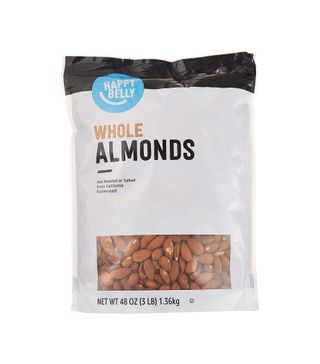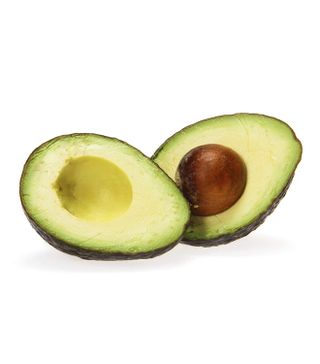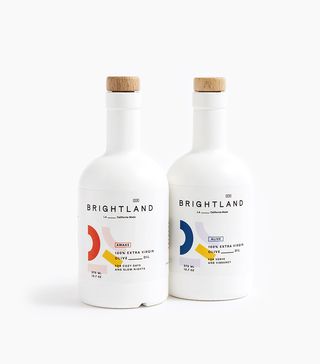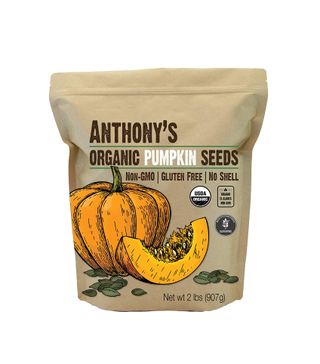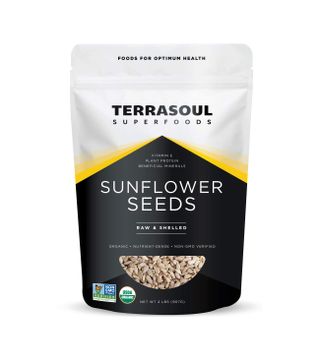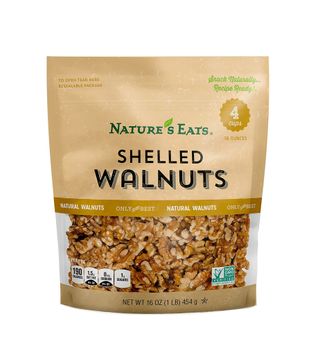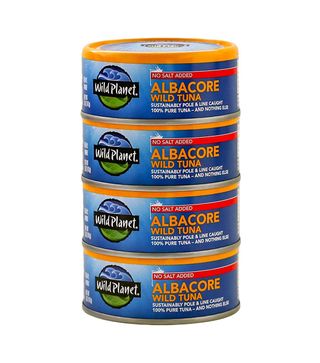Here's What the Experts Want You to Know About Good and Bad Fats

When you think of the word "fats," especially when it comes to eating, it most likely has a negative connotation. Buzzwords like low-fat and non-fat are popular because a lot of us believe that all fats are bad for you. But that's totally not the case. In fact, not all fats are created equally, and they're all different.
To start, fats are actually important for your body. Sarah Rueven, MS, RDN, CDN, founder of Rooted Wellness, says that fat is one of the three macronutrients, in addition to protein and carbohydrates. "We need macronutrients in large amounts (hence the name 'macro') in our diet to sustain life as they provide calories and essential nutrients."
They have so many functions as well. "Fats are a really big deal because they support many functions in the body such as providing energy, maintaining body temperature, regulating hormones, and absorbing important nutrients," explains women's health dietitian and founder of Flourish Heights, Valerie Agyeman, RD. "They also help you feel fuller longer and are super delicious." Additionally, fats help absorb the fat-soluble vitamins, like vitamins K, A, D, and E. Fats also act as insulation; protect vital organs and structures within the body; help our brains to function properly; play a role in decreasing inflammation; and support hormone production and muscle growth.
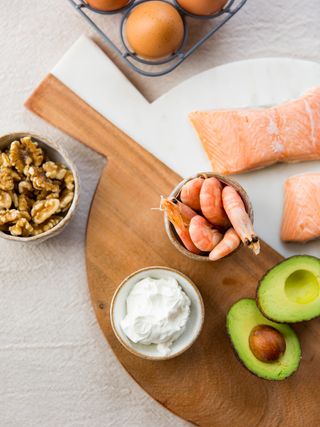
So, yes, fats really can't be cut out of your diet entirely. And yes, there are so-called "good" and "bad" fats, but it's a lot more complicated than that, and every dietitian I spoke to for this article emphasized that it's not exactly cut and dry. "I do not like positioning food as good versus bad," Rueven says. "Instead, I like to say that there are some foods that are more nutritious than others and that we should include more often in our diet. In the case of fats, unsaturated fats provide more nutrients and are more beneficial for our bodies while saturated fats are less nutritious and when eaten in excess can negatively impact cardiovascular health."
And Yasi Ansari, MS, RD, CSSD, a national spokesperson for the Academy of Nutrition and Dietetics, adds that understanding how fats affect our health can be somewhat complex. "For example, although a diet rich in saturated fats can increase cholesterol, more information is needed on the long-term health effects of consuming saturated fats, especially if your eating pattern also contains a pattern rich in mono and/or polyunsaturated fatty acids. You are still getting all the benefits from those fats as well!"
Ansari says that some foods contain varying levels of saturated, mono, and polyunsaturated fats to make things even more complex. So although a food may be higher in saturated fatty acids, it may also be high in mono and polyunsaturated fatty acids.

When working with her clients, Ansari says it's important to understand which foods and types of fats they have more access to. There are certain oils and foods that may be more affordable and available than others. "The goal will be to understand your client, the foods they eat, and what is accessible to them. From there, recommendations can be made on which dietary practices to implement to offer health benefits," she says.
In short, it's all about a balance with all the fats, and an emphasis on some more than others. To help you decipher the different kinds of fats, take a look at the categories below.
Types of Fats
Trans Fats

This is the type of fat you'll want to avoid. "Trans fats are considered to be the worst type of fat you can eat," Rueven says. It both raises your LDL cholesterol, while lowering your good HDL cholesterol. A diet high in trans fats puts you at risk for heart disease, increased chronic inflammation, and arterial plaque buildup. Trans fat is most prevalent in partially hydrogenated oil. This particular oil increases a food's shelf life, and it is often found in processed foods like baked goods containing shortening, ready-made frostings, chips and snacks, fried food, refrigerated dough, and margarine. There is strong evidence that consuming trans fats may promote greater insulin resistance."
Saturated Fats
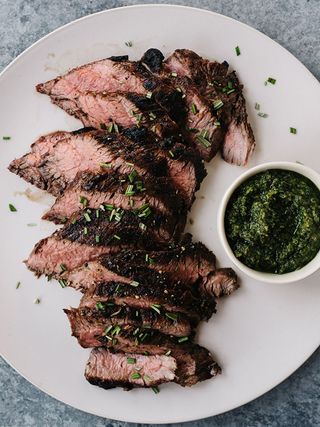
"Saturated fats are those fats found in animal-based foods," Rueven says. "While saturated fat may raise LDL ('bad' cholesterol), it also increases HDL ('good' cholesterol), so the net impact on cholesterol and heart health is less concerning than we once thought. Your best bet is to eat these foods less than unsaturated fat, but you don't need to completely remove them from your diet."
You'll find saturated fats in animal products (like meat and poultry skin), high-fat dairy products, butter, and coconut oil.
Unsaturated Fats
"When we talk about good fats or healthy fats, we are referring to unsaturated fats," Rueven says. "These fats are found in plant-based foods and can be broken down into two types: monounsaturated fats and polyunsaturated fats." Ansari encourages emphasizing monounsaturated and polyunsaturated fatty acids in your diet, rather than saturated fats (but you don't have to cut them out entirely). Here's the difference between the two.
Monounsaturated Fats

"Monounsaturated fatty acids can lower cholesterol levels and are found in foods like nuts, avocado, and oils such as olive and canola," Ansari says. You can also find monosaturated fats in seeds such as pumpkin and sesame.
Polyunsaturated Fats
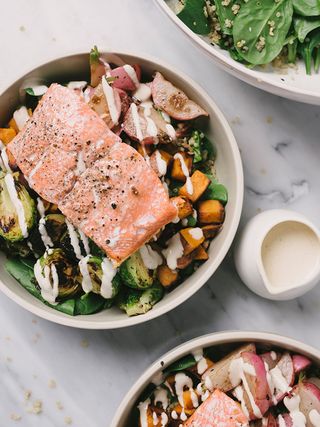
"Polyunsaturated fats (PUFAs) are found in many vegetable oils as well as certain nuts such as walnuts and pine nuts, and seeds such as sunflower seeds and flax seeds," Rueven explains. "The healthiest fat of them all, polyunsaturated omega-3 fatty acids, can be found in some fatty fish such as salmon, mackerel, tuna, and sardines, as well as certain nuts and seeds like walnuts and flaxseed. Omega-3 fatty acids help to keep the brain healthy, reduce triglyceride levels, and promote heart health." You can also find PUFAs in eggs and soybeans.
Ansari adds that our body cannot make omega-3s and omega-6s, so we need to get them from our diet.
Some Other Tips for Consuming Fats

While you should care about the different types of fats, you don't need to stress about it way too much. "Eating a plant-heavy diet based primarily around real, whole foods is one of the best ways to ensure you are eating a diet that supports your health," Rueven says. "Fats coming from animal-based sources (with the exception of fatty fish!) and heavily processed foods are those that we should limit in our diet. Include these fats in moderation. Make them an every-once-in-a-while thing rather than a daily part of your diet." Since fats are digested the most slowly and therefore keep us full longer, Rueven recommends including a source of healthy fat at each meal to prolong satiety and reap all the benefits for your heart, brain, and body.
And Ansari suggests focusing on adding a variety of these "good" fats in your diet in addition to whole grains, proteins, fruits, and vegetables. For example, add avocado to your eggs; nuts to your hot or overnight oats; avocado to your tacos; and flaxseeds to your yogurt.
Next: Hands Down, These Are the Best Carbs to Eat
Disclaimer
This article is provided for informational purposes only and is not intended to be used in the place of advice of your physician or other medical professionals. You should always consult with your doctor or healthcare provider first with any health-related questions.
Sarah is lifestyle writer and editor with over 10 years of experience covering health and wellness, interior design, food, beauty, and tech. Born and raised in Los Angeles, she attended New York University and lived in New York for 12 years before returning to L.A. in 2019.
In addition to her work on THE/THIRTY and Who What Wear, she held editor roles at Apartment Therapy, Real Simple, House Beautiful, Elle Decor, and The Bump (sister site of The Knot).
She has a passion for health and wellness, but she especially loves writing about mental health. Her self-care routine consists of five things: a good workout, “me” time on the regular, an intriguing book/podcast/playlist to unwind after a long day, naps, and decorating her home.
-
 I Only Ate Sakara Life Meals for 30 Days—Here Are 7 Things That Happened
I Only Ate Sakara Life Meals for 30 Days—Here Are 7 Things That HappenedThe brand's 30-Day Fall Reset is finally here.
By Erin Jahns
-
 The 6 Warning Signs You're Not Getting Enough Protein
The 6 Warning Signs You're Not Getting Enough ProteinAnd what to eat to up your intake.
By Sarah Yang
-
 Everything This Professional Ballet Dancer Eats to Fuel Her For Performances
Everything This Professional Ballet Dancer Eats to Fuel Her For PerformancesHer grocery staples include high-quality French butter.
By Candice Aman
-
 These 8 Foods Are the Worst for Rosacea—Here's What to Eat Instead
These 8 Foods Are the Worst for Rosacea—Here's What to Eat InsteadControl those flare-ups.
By Sarah Yang
-
 15 Things That Cause Bloating and How to Get Rid of It ASAP
15 Things That Cause Bloating and How to Get Rid of It ASAPTry these.
By Sarah Yang
-
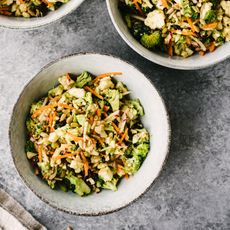 Is the Alkaline Diet Overhyped? What Experts Want You to Know
Is the Alkaline Diet Overhyped? What Experts Want You to KnowHere's how it works.
By Sarah Yang
-
 I'm an Imperfect Dietitian and My Key to Eating Healthy Meals Is Convenience
I'm an Imperfect Dietitian and My Key to Eating Healthy Meals Is ConvenienceTake a peek at my weekly grocery staples.
By Candice Aman
-
 Avoid These 6 Foods—They'll Wreck Your Gut Health
Avoid These 6 Foods—They'll Wreck Your Gut HealthWhat to eat instead.
By Sarah Yang
